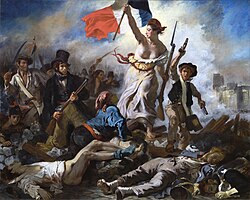
Back عصيان مدني Arabic عصيان مدنى ARZ আইন অমান্য Assamese Desobediencia civil AST Грамадзянскае непадпарадкаванне Byelorussian Грамадзянскае непадпарадкаваньне BE-X-OLD Гражданско неподчинение Bulgarian আইন অমান্য Bengali/Bangla Desobediència civil Catalan Občanská neposlušnost Czech
| Part of a series on |
| Political revolution |
|---|
 |
|
|
| Part of a series on |
| Libertarianism |
|---|
Civil disobedience is the active, and professed refusal of a citizen to obey certain laws, demands, orders or commands of a government (or any other authority). By some definitions, civil disobedience has to be nonviolent to be called "civil". Hence, civil disobedience is sometimes equated with peaceful protests or nonviolent resistance.[1][2] Henry David Thoreau's essay Resistance to Civil Government, first published in 1849 and then published posthumously in 1866 as Civil Disobedience, popularized the term in the US, although the concept itself has been practiced longer before.
Various forms of civil disobedience have been used by prominent activists such as American women's suffrage leader Susan B. Anthony in the late 19th century, Egyptian nationalist Saad Zaghloul during the 1910s, and Indian nationalist Mahatma Gandhi in 1920s British India as part of his leadership of the Indian independence movement. Martin Luther King Jr.'s and James Bevel's peaceful nonviolent protests during the civil rights movement in the 1960s United States sometimes contained important aspects of civil disobedience. Although civil disobedience is rarely justifiable in court,[3] King regarded civil disobedience to be a display and practice of reverence for law: "Any man who breaks a law that conscience tells him is unjust and willingly accepts the penalty by staying in jail to arouse the conscience of the community on the injustice of the law is at that moment expressing the very highest respect for the law."[4]
- ^ Violent Civil Disobedience and Willingness to Accept Punishment, vol. 8, Essays in Philosophy, June 2007, archived from the original on 13 June 2010, retrieved 12 March 2015
- ^ John Morreall (1976), "The justifiability of violent civil disobedience", Canadian Journal of Philosophy, 6 (1): 35–47, doi:10.1080/00455091.1976.10716975, JSTOR 40230600, S2CID 152691269
- ^ Steven L. Emanuel (January 2007), Criminal Law, Aspen, ISBN 9780735558182
- ^ Brooks, Ned. "Meet The Press: Martin Luther King, Jr. on the Selma March". NBC Learn. NBCUniversal Media. Archived from the original on 5 July 2018. Retrieved 22 November 2017.